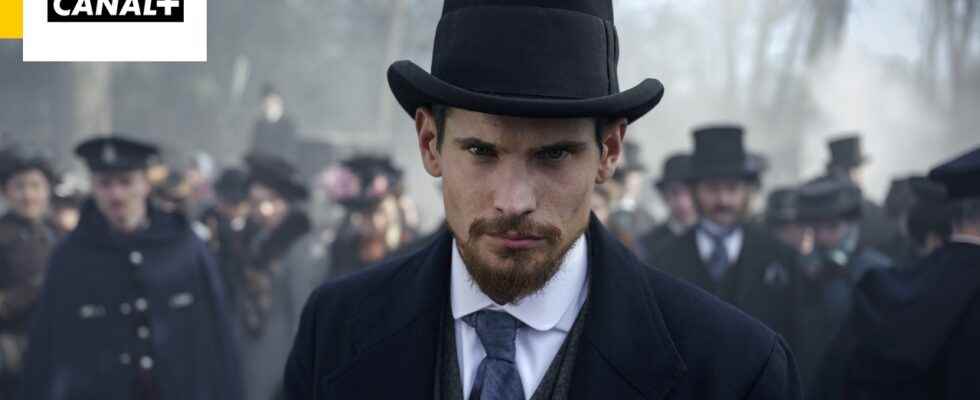Canal+ is launching this Monday evening the broadcast of “Paris Police 1905”, a sequel to the police series “Paris Police 1900”, which follows Inspector Jouin in a new investigation that will take him to the less glorious corners of the Bois de Boulogne. .
Christmas 1904. “No prostitutes in the streets of Paris during Holy Night”: under political and media pressure, the prefect is forced to organize a raid. He entrusts the dirty work to the morality police. An unidentified dead man is discovered in the Bois de Boulogne. Suicide… or murder?
This investigation leads Inspector Antoine Jouin into a clandestine and secret territory, where all of Paris comes to satisfy their impulses. Jouin will have to leave the beaten track… at his own risk and peril, to enter a whirlwind of vices, corruption and blackmail.
From Monday December 12 on CANAL+. Episodes seen: 3/6
We take the same and start again ! In Paris Police 1905, the direct sequel to Paris Police 1900 broadcast in February 2021 on Canal+, Fabien Nury, the creator and screenwriter, chose to call on the same actors to continue the saga which should extend over 3 seasons.
Jérémie Laheurte, an actor discovered in La Vie d’Adèle and seen recently in Notre-Dame brule or La cour, thus slips into the skin of Antoine Jouin, who is no longer a young beginner policeman.
Canadian actress Évelyne Brochu (Orphan Black, Thanksgiving) portrays courtesan Meg Steinheil, who has lost her luster over the past five years, while Marc Barbé (Crossing Lines) once again lends his features to Prefect Lépine. Thibaut Evrard (Borgia) embodies the big-hearted bear Fiersi, who has become Meg’s henchman. Eugénie Dérouand, meanwhile, resumes her role as lawyer Jeanne Chauvin.
Fabien Nury had announced it at the launch of Paris Police 1900: the series would be a trilogy revolving around the same characters, and with each new season, a leap in time would take place. If Paris Police 1900 took place during the summer of 1899, this second part therefore takes place a little more than five years later, in 1904, in the middle of the Christmas period. And during these five years, the lives of Antoine Jouin, Meg Steinheil, the prefect Lépine and all the others have changed a lot.
No more innocent young inspector, Antoine Jouin is now a seasoned policeman who has trouble proving himself to the hierarchy. And it is not the investigation around a man who, according to the clues, seems to have committed suicide, which will allow him to restore his image. Especially since this new mystery will push the policeman to face his own inner demons when he begins to explore the less brilliant parts of the Bois de Boulogne.
For her part, Meg, a former courtesan envied for her beauty, has lost her luster. She no longer sells her charms but runs the most exclusive gambling circle in Paris. For her very private evenings, she uses the vernissages of her husband, Adolphe.
As for Fiersi, he now works for Meg since he was fired from the prefecture. But this work could turn out to be more dangerous than he thinks. Finally the prefect Lépine, broken by the death of his wife, doubts and thinks of resigning.
The death of a newborn baby following a roundup of prostitutes he ordered before Christmas Day will hasten his decision. But before leaving, he wants to clean up the prefecture by getting rid of its most corrupt agents.
The Dreyfus affair, Fort Chabrol and the coup attempts of 1899 are only a distant memory. The characters of Paris Police must now face new challenges that will lead them to explore their internal conflicts. The physical violence of the first season now gives way to a Christmas tale that is closer to a gothic novel than a dark thriller.
The psychology of the characters is treated more in depth, thus offering us a much more mystical series with a particular atmosphere. The Bois de Boulogne becomes a being in its own right where desire rubs shoulders with death and where the State and the Church do not seem to be able to exercise control. To write this second season, Fabien Nury drew on the criticism of the first burst of episodes in order to offer a much more intimate series.
Where the first season could be criticized for having too many characters, this season 2 reduces the number of protagonists and avoids losing the viewer in useless plots. The result is a season 2 that is still as pleasant to watch, which moves away from the history lesson to interfere in the intimacy of the characters who gain in depth.
